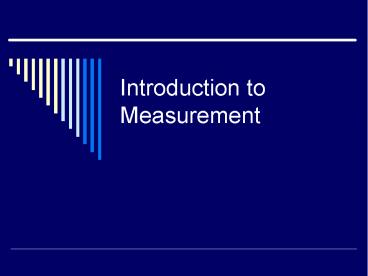Introduction to Measurement - PowerPoint PPT Presentation
Title:
Introduction to Measurement
Description:
Introduction to Measurement – PowerPoint PPT presentation
Number of Views:1527
Avg rating:3.0/5.0
Title: Introduction to Measurement
1
Introduction to Measurement
2
According to Lord Kelvin
- When you can measure what you are speaking about
and express it in numbers, you know something
about it but when you cannot measure, when you
cannot express it in numbers, your knowledge is
of a meager and unsatisfactory kind it may be
the beginning of knowledge, but you have
scarcely, in your thoughts, advanced to the stage
of a science.
3
What is Measurement?
- Measurement is the process by which numbers or
symbols are assigned to attributes of entities in
the real world in such way as to describe them
according to clearly defined rules.
4
Why do we Measure?
- To characterize
5
Why do we Measure?
- To characterize
- To evaluate
6
Why do we Measure?
- To characterize
- To evaluate
- To predict
7
Why do we Measure?
- To characterize
- To evaluate
- To predict
- To improve
8
Some Difficult Measurement Questions
- In a room with blue walls, is blue a measure of
the color of the room? - Can intelligence be measured? Is IQ an adequate
measure? - Should we reject measures because they cannot be
accurately measured or because they depend on the
judgment of the person doing the measuring?
9
Some Difficult Measurement Questions (Contd)
- How do we decide which error margins are
acceptable in measurement and which are not? - How do we determine the correct scale for a given
measurement? - What kinds of manipulation are we able to do to
our measurements and still have meaningful
results?
10
Galileo Galilei (1564 1642)
- What is not measurable
- make measurable
11
Direct and Indirect Measures
- Direct Measures direct quantification as in
measuring the height of a person. - Indirect Measure calculations involving
multiple measures as in a grade point average.
12
Measurement in Software Engineering
- Computer Science provides the theoretical
foundations for building software. - Engineering focuses on implementing the software
in a controlled and scientific way.
13
Neglect of Measurement in Software Engineering
- Failure to set measurable targets for our
software products. (Projects without clear
goals will not achieve their goals clearly, Tom
Gilb) - Failure to understand and quantify the component
costs of software projects. - Failure to quantify or predict the quality of
produced products. - Guided by anecdotal evidence in deciding to try
new approaches instead of doing carefully
controlled studies
14
Tom DeMarco (1982)
- You cannot control what you cannot measure
15
Objectives for Software Measurement (Managers)
- What does each process cost?
- How productive is the staff?
- How good is the code being developed?
- Will the user be satisfied with the product?
- How can we improve?
16
Objectives for Software Measurement (Engineers)
- Are the requirements testable?
- Have we found all the faults?
- Have we met our product or process goals?
- What will happen in the future?
17
Purposes of Measurement in Software Engineering
- Understand
- Control
- Improve
18
The Scope of Software Metrics
- Cost and effort estimation
- Productivity measures and models
- Data collection
- Quality models and measures
- Reliability models
- Performance evaluation and models
- Structural and complexity metrics
- Capability maturity assessment
- Management by metrics
- Evaluation of methods and tools
19
Productivity Measures and Models
20
Quality Models and Measures































